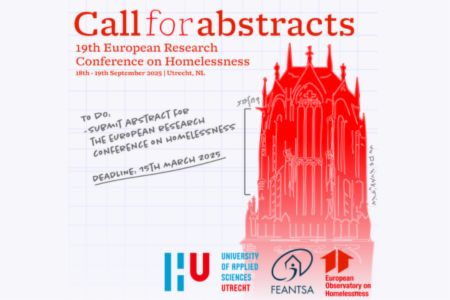JOINT STATEMENT
Green housing must be affordable and inclusive for all: Key vote at the European Parliament leaves questions about social safeguards unanswered
FEANTSA, Fondation Abbé Pierre, Housing Europe & International Union of Tenants
Download the joint statement
On 9 February, the European Parliament ITRE committee has adopted a text that could be a decisive step in favour of decent and affordable housing, once finally approved by both the European Parliament and the Council of Minsters. The European Parliament and the Council will now negotiate the final version of the text.
At this stage, the revised Energy Performance of Buildings Directive (EPBD) could take two very different routes: while it has the potential to be ground-breaking for low- and middle-income groups, enabling them to access quality affordable and healthy housing, it could also push them further into housing exclusion and provoke a wave of renovictions. Organisations working for affordable housing welcome the fact that the energy-efficient renovation of worst-performing homes will be increased but they also advocate for strong social safeguards to avoid unintended negative social consequences.
Delivering on the promised fairness of the energy transition
The EPBD proposal aims to introduce Minimum Energy Performances Standards (MEPS), establishing a roadmap for existing buildings to achieve higher energy ratings (class E by 2030 and class D by 2033) for residential buildings. This energy performance initiative will bring significant social, health, and economic benefits for low- and middle-income vulnerable households, as they are most likely to live in inadequate, unaffordable and underperforming homes. However, renovations come at a cost, and social housing provider, landlords, homeowners, and ultimately tenants will have to pay the price. Past renovation programmes have often led to unintended negative consequences such as increased overall housing costs, evictions by renovations (renovictions), gentrification, displacements of former residents as well as housing exclusion. Therefore, whatever form MEPS take, it is essential that their introduction is backed by mandatory social safeguards.
In its current form, the Social Climate Fund is unable to deliver on the promise of a transition that will leave no one behind. However, the EPBD text itself could lay the basis for a fairer transition. Therefore, social and affordable housing providers, tenant organisations, and key groups fighting homelessness and poverty call on the European Parliament and the Council to secure that all necessary social safeguards for the MEPS are included and remain in the EPBD.
By introducing minimum standards for energy performance, the EPBD should ensure the cost neutrality of renovations, preventing rental or mortgage costs from exceeding the energy cost savings after renovation. Rent caps and rent stabilisation mechanisms can effectively prevent increased housing cost burdens. Barbara Steenbergen, head of the International Tenants Union (IUT) EU office, noted that ‘housing cost neutrality should apply for all energy retrofits: renovations must lead to decreased costs due to energy savings and rent increases that are higher than savings are to be avoided both in the private and the public and social housing sector.’
Special attention should be paid to poorly regulated private rental markets, where it is more difficult to protect tenants.
The EPBD should encourage Member States to actively prevent evictions, displacement and gentrification related to energy retrofitting, especially if implemented at district level. Technical, social and administrative support, preferably in the form of integrated renovation services, can guarantee that households are included and have access to well-implemented renovation programmes. We call for the highest level of institutional participation and democracy for tenants and vulnerable homeowners to be on an equal footing with landlords, housing providers, building managers and developers.
Availability of adequate and sufficient financial resources for low-income, middle-income and vulnerable households to renovate their homes
The part of the proposal focusing on financial incentives shall secure that the EPBD is socially inclusive. A sufficient, adequate, and proportional share of EU, national, and regional funding should be earmarked for low-and middle-income households, especially if they live in energy poverty or are vulnerable consumers. The funding shall fully cover the upfront costs of vulnerable homeowners and renovations should not impose a financial burden on either tenants or low-income homeowners.
‘A comprehensive financial mix of progressive non-repayable grants (providing the highest support for the poorest), interest-free loans, micro-savings and other socially responsible innovative financial solutions are needed. An ideal mix of funding can guarantee access to renovations even for the poorest households and provide tailor-made solutions for different income groups to overcome split incentives and lack of savings. Not all households can benefit from pay-as-you-save formulas as they might have been under-consuming, or they rely on solid fuels’ – says Freek Spinnewijn, director of the European Federation of National Organisations Working with the Homeless, FEATNSA, highlighting that ‘all vulnerable groups should have access to adequate financial resources.’
‘For the new building’s directive, the EU would need to apply its “united in diversity” motto. This means taking into account, in addition to the financial implications, different climates, types of buildings, district or geothermal heating potential, and the amount of already renovated homes in different Member States while keeping the main green goal in focus. At the moment, key players in the Housing Europe network actually implementing renovations are not given sufficient room for manoeuvre to work with the resources, they have on the ground and that must be addressed,’ the Secretary General of Housing Europe, the voice of public, cooperative and social housing, Sorcha Edwards said.
Ultimately, delivering affordable energy renovations for vulnerable households has more benefits beyond social and energy fairness. It would effectively help the EU fight climate change, achieve carbon neutrality, improve indoor and outdoor air quality as well as increase employment in underprivileged areas. It would even provide financial benefits through tax returns and health cost savings.
European Parliament should not up the MEPS ambition without ensuring the safeguards. The upcoming negotiations between the European Parliament and the Council (trilogues) should strengthen social safeguards- without this regulation, we risk a massive wave of renovictions and displacements all over Europe.
‘However, we will not be able to lead the ecological transition without addressing its social aspect.’- highlights Christophe Robert, managing director of Fondation Abbé Pierre.
Finally, it is crucial to enlarge the affordable, community- based and social housing sector which plays a leading role in providing affordable housing while upgrading dwellings to meet necessary energy-efficiency standards. Affordable housing options should also be developed and made available where social and affordable housing and community-based solutions are not yet mainstream.
Now, making green housing affordable to all layers of society is in the EU policy makers’ court. It is time to play a fair and inclusive game.
Sorcha Edwards, Secretary General, Housing Europe
Christophe Robert, managing director of Fondation Abbé Pierre
Freek Spinnewijn, Director, FEANTSA
Barbara Steenbergen, Head of International Union of Tenants (IUT) Brussels office






